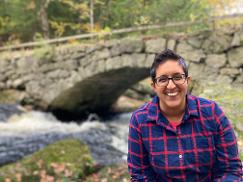Maybe because I couldn’t let myself fully acknowledge your existence before you were born. Because my body had failed to make you. Because the road to you was unmapped, rocky, full of wrong turns and potholes. Because all anyone wanted to ask me about was the donor—his race, his appearance, his genetics. Maybe because I didn’t feel you growing in my body, I couldn’t fully confront my motherhood until you were actually here.
Maybe because I couldn’t give my brain permission to prepare for you ahead of time, now I find that I become a mother again and again, rediscovering my motherhood each time.
It began the moment I held your body against mine, buried my face into your thick black hair, still damp with blood and amniotic fluid. I held my breath for 40 weeks, waiting for you to arrive, inhaled deeply only when you were in my arms, your bare skin alongside my own. That earthy scent permeated my nostrils, lingers there even today. I smell it each time I press my nose into your scalp and breathe in. The first reminder of my motherhood.
I became a mother again the moment we finalized your name, having stalled the birth registry as long as possible, and you became our Kahani. Our story. Named for Rushdie, for the town built in his imagination. A town that had lost its stories, and forgotten its name, until a boy named Haroun went and found them, and reminded the town that her name was Kahani. You will write your own story, but you will carry our names with you.
I became a mother again the first night we brought you home, when you woke every time we put you down, because we didn’t yet know how to put you down, and I stayed awake in the rocker for the hours between feedings, let you sleep on my chest, put your needs before mine. My hoodie was spotted with your spit up, and I emerged in the morning bleary eyed and exhausted, fearful of what my life had become, yet still enthralled by your existence. We had waited so long, fought so hard, and now you were here. Irrevocably ours.
In the absence of biology, I find my motherhood in sharing my identity with you. In seeing glimmers of that identity reflected back to me.
Each time you wear a onesie sent by West Virginia friends that declares you mountain made, or calls you a lil Appalachian, or plasters a Y'all across your chest.
The first time you wore the najaria bought by your Swatimasi, delicate black and gold beaded bracelets designed to ward off an evil eye I refuse to believe in, but want to shield you from nonetheless.
The day your hair got long enough to style the bangs into the same spiky upwards swoop I wear mine in, and we took hair twin pictures.
The afternoons when we walk around Jamaica Pond and I show you juvenile eagles, ducks and geese, snapping turtles, hooded mergansers your eyes are not strong enough yet to see. I show you nonetheless, will show you each season until you are able to show me.
The witching hours when I bounce you as we listen to Bill Withers. To Dolly Parton. To Lata Mangeshkar. To Bad Bunny. To Zap Mama. To John Prine. To Brandi Carlile. To the soundtracks of my ancestry, my geography, my present-day. Each song a fragment of colored glass, I pour them out on the floor, arrange and fuse them to one another in an effort to create a coherent whole. One set of shards, my Gujarati roots. Another, my Appalachian upbringing. A third, two decades teaching middle school students in Boston. If I hold the resulting mosaic up to the light, up to your face, maybe you will know who I am. Maybe you will someday know who you are.
In the absence of biology, I find my way to mothering you each day anew.

